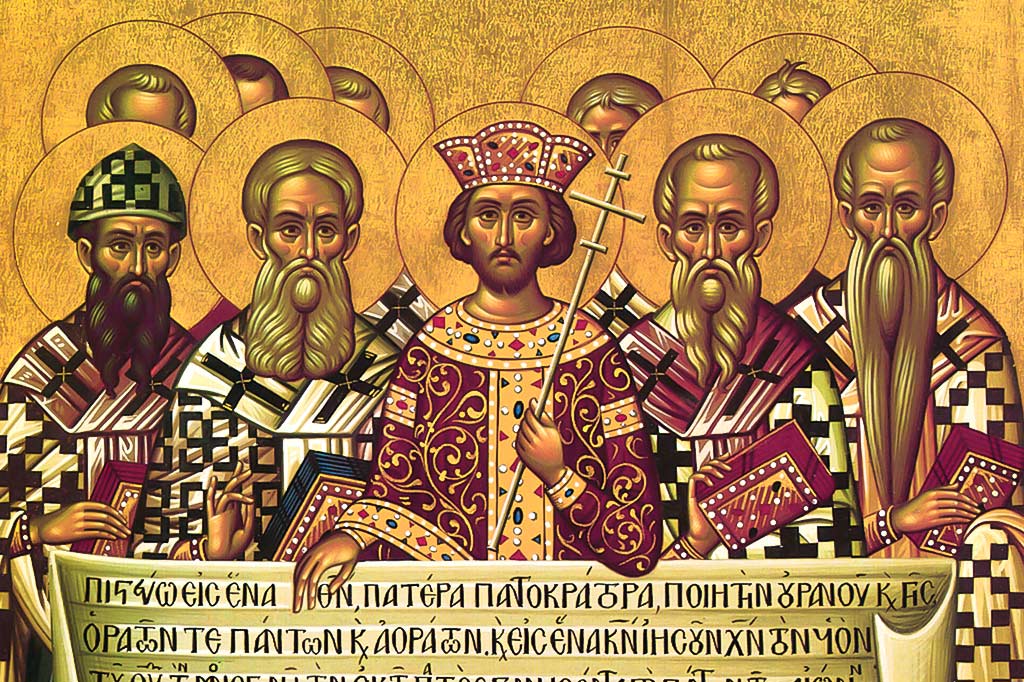Introduction
The seventh Sunday after the Feast of Holy Pascha is observed by the Orthodox Church as the Sunday of the Fathers of the First Ecumenical Council. This day commemorates the 318 God-bearing Fathers who gathered in Nicaea in 325 at the request of the Emperor, Saint Constantine the Great, to address the heresy of Arianism together with other issues that concerned the unity of the Church.
Commemoration of The Great and Holy Feast of Pascha
Arius was a protopresbyter of the Church of Alexandria, and in 315, he began to blaspheme against the Son of God saying that He was not the true God, consubstantial with the Father, but rather a work or creation of God and different from the essence and glory of the Father. He also taught that the Son of God had a beginning. These teachings shook the faithful at Alexandria. The Bishop of Alexandria, Alexander, attempted to correct Arius through admonitions, cut him off from communion, and finally deposed him in 321 through a local council. Arius continued with his heretical teachings, creating controversy and division in the churches of other cities, which led to a theological and ecclesiastical crisis throughout the Christian Church.
Moved with divine zeal and concern for unity, the Emperor Constantine the Great, equal to the Apostles, summoned the First Ecumenical Council in Nicaea, a city of Bithynia. It was in this place that the bishops of the Church gathered in 325. All of them, with one mouth and one voice, declared that the Son and Word of God is one in essence with the Father, true God of true God. The Fathers composed the holy symbol of Faith, the Nicene Creed:

The Fathers also anathematized Arius for his heretical beliefs and teachings, cutting him off from the Church.
Recognizing the divine Fathers of the First Ecumenical Council as heralds of the Faith after the divine Apostles, the Church of Christ has appointed this present Sunday for their annual commemoration, in thanksgiving and unto the glory of God, unto their praise and honor, and unto the strengthening of the true Faith.
Icon of the Sunday of the Fathers of the First Ecumenical Council
The icon of the Sunday of the Fathers of the First Ecumenical Council depicts Saint Constantine together with the God-bearing Fathers and Saints of the Church who attended the Council and affirmed the unity of the Faith through the Nicene Creed. The Fathers are shown holding the text of the Creed, also referred to as the Symbol of Faith.
Orthodox Christian Celebration of the of the Sunday of the Fathers of the First Ecumenical Council
The Sunday of the Fathers of the First Ecumenical Council is celebrated with the Divine Liturgy of Saint John Chrysostom. This is the first Sunday after the leave-taking or apodosis of Pascha, and the celebration of the Feast of the Ascension. The services of Vespers, Orthros, and the Divine Liturgy include hymns of both the Ascension and in commemoration of the Fathers.
Scripture readings for the feast are the following: At the Divine Liturgy: Acts 20:16-18, 28-36 and John 17:1-13.
Hymns of the Feast
Apolytikion (Plagal of the Fourth Tone)
You are greatly glorified, O Christ our God, who established our Fathers as luminaries upon the earth, and through them led us all to the true Faith. O Most compassionate, glory to You.
Kontakion (Plagal of the Fourth Tone)
The Church was strengthened into one faith through the preaching of the Apostles and the doctrines of the Fathers. The Church is robed in truth woven of the word of God from above. It teaches truth, and glorifies the great mystery of faith.
